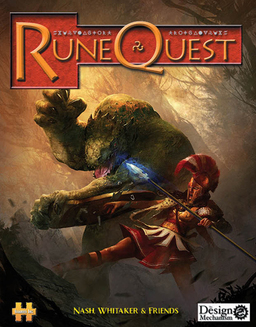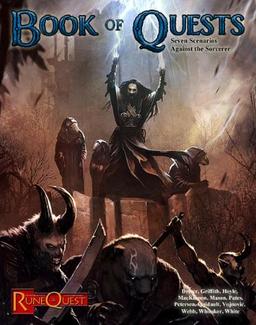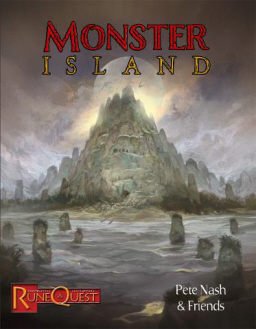Appendix N: Carrying on the Flame
 As recently posted here at Black Gate by James Maliszewski in his article “The Other Appendix N,” the very first Appendix N bibliography of inspirational reading ever printed in a roleplaying game was actually in the 1978 edition of Chaosium’s RuneQuest; a year before Gygax released his own homage in the AD&D Dungeon Masters Guide. Whilst it merely followed the time honored convention of academic publications, few remember nowadays that it was RuneQuest which started an institution in roleplaying that still continues to this day.
As recently posted here at Black Gate by James Maliszewski in his article “The Other Appendix N,” the very first Appendix N bibliography of inspirational reading ever printed in a roleplaying game was actually in the 1978 edition of Chaosium’s RuneQuest; a year before Gygax released his own homage in the AD&D Dungeon Masters Guide. Whilst it merely followed the time honored convention of academic publications, few remember nowadays that it was RuneQuest which started an institution in roleplaying that still continues to this day.
Surprisingly, the differences between the two bibliographies are quite stark. RuneQuest’s list, rather scholarly, incorporated a lot of ancient history texts, books of military warfare, and Nordic sagas; whereas AD&D’s was more devoted to fantastical fiction, especially the less well-known authors of the genre. Central to both bibliographies, however, are some familiar names: Robert E. Howard, Fritz Leiber, Michael Moorcock, Clark Ashton Smith, and JRR Tolkien. Other than that, there was little overlap between the two.
Whilst these recommended reading lists reveal each game’s designers’ interests and objectives, it also highlighted that every writer is heavily influenced by the literature they read, and by implication, those stories available to them at the time.
For Gary Gygax, a man turned forty by the time he wrote the Dungeon Masters Guide, the early works of fantasy authors such as Poul Anderson, Leigh Brackett, Fox Gardner, Andre Norton, Jack Vance, and Roger Zelazny were readily available in bookshops, hot off the press. Indeed, almost all of the books on his inspirational reading list would have been as easy to pick up as purchasing a copy of A Game of Thrones is today.
Although the combined authors of RuneQuest were less than a decade younger, their drier bibliography somehow never matched the mystique of Gygax’s subsequent list, despite the fact that the game itself gripped my imagination with a far tighter hold. This fascination was more due to the Classical style of its illustrations combined with Greg Stafford’s wondrously magical world of Glorantha, with its roots firmly grounded in diverse mythologies – alas, unlisted in the first Appendix N.
When Lawrence Whitaker and I set about refining and re-launching RuneQuest as a quality roleplaying game, we too were influenced by our own youthful reading.
 Firmly separating the core rules from Glorantha, we embraced the darker, more mature Sword and Sorcery genre, and as part of the book we decided to include our own bibliography, submitting those authors and works which we loved. Our combined list was more akin to Gygax’s, based mainly in fantasy literature, but that contemporary to our teenage years.
Firmly separating the core rules from Glorantha, we embraced the darker, more mature Sword and Sorcery genre, and as part of the book we decided to include our own bibliography, submitting those authors and works which we loved. Our combined list was more akin to Gygax’s, based mainly in fantasy literature, but that contemporary to our teenage years.
Popular authors we read in the seventies and eighties had shifted from those who had gained fame earlier in the twentieth century. Although we also included the greats as mentioned by the original Appendix N, gone were — amongst others — John Bellairs, Fredric Brown, August Derleth, Abraham Merritt, Fletcher Pratt, and Jack Williamson, instead to be replaced by up-and-coming authors like Glen Cook, David Gemmell, Julian May, or the Thieves World anthologies. Those fantasy books which were readily available in bookstores at the time.
Since publishing RuneQuest 6th Edition, our first two supplements have continued to be illustrative of our personal preferences in fantasy and fiction.
The Book of Quests is a sequential series of guest-written scenarios, set in a land of secretive cults and chaos-twisted monsters, with a sorcerer as the main antagonist and an overarching storyline to save the world from an apocalyptic doom.
Designed and edited by my co-collaborator Lawrence, his ideas are heavily influenced by the Silver Age fantasy of Michael Moorcock, with a touch of Mervyn Peake descriptive exposition and Bernard Cornwell grittiness for extra flavor. Predictably, it encapsulates a lot of the nostalgic feeling I have for some of the early Fighting Fantasy books or Lone Wolf series.
Conversely, Monster Island is a sandbox campaign setting, written as a deliberate pastiche of Golden Age Sword & Sorcery. An unashamed blend of Clark Ashton Smith, Robert E. Howard, Burroughs, Moore, and even a taste of Kipling and Rider Haggard, it describes a jungle-covered lost world, filled with horrifying monsters, ancient ruins, and degenerate serpent people, still masters of forbidden sorcery.
 While the Book of Quests has a traditional ‘old-school’ feel to its material and has received glowing reviews, the response to Monster Island has been somewhat of a surprise. Many purchasers have been taken by storm by its evocative alienness, something I distilled from those early S&S tales, but which seems to be unfamiliar to many, especially younger readers who have never experienced the genre in books or games before.
While the Book of Quests has a traditional ‘old-school’ feel to its material and has received glowing reviews, the response to Monster Island has been somewhat of a surprise. Many purchasers have been taken by storm by its evocative alienness, something I distilled from those early S&S tales, but which seems to be unfamiliar to many, especially younger readers who have never experienced the genre in books or games before.
I cannot express how sad this makes me feel. I still possess a sense of exciting mystery and visceral danger whenever I read a Conan story for the umpteenth time. The recent interest in rediscovering early fantasy has helped return many unsung authors to the eye of the gaming world… yet as seen by a growing number of less appreciative opinions and reviews, many of these early works have not stood the test of time.
Some suffer from intolerant modern attitudes towards older cultural views, uncomprehending that our own morals today are merely an ephemeral judgment of eternally evolving social conventions. Others bemoan the use of exotic prose or archaic language which grates upon younger tastes or that they are written as concise, fast-paced pulps in glaring contrast to today’s multi-volume doorstep-thick, soap operas.
Unfortunately, in the current literary environment, archetypal Sword & Sorcery tales are out of vogue. So it is up to people like us to remember what made those early tales endure and not let them be forgotten, overlooked as the work of bigots or crude pieces of purple prose. Instead, we should recommend them to our friends and readers and let them enter the humid tropical jungles of Stygia, recoil from the antique dusty horrors of Zothique, or slink along the dark twisting streets of rogue-filled Lankhmar, so that they may follow their own path to less-known worlds of imagination.
To do that, we all need to promote these works. Lawrence and I at the Design Mechanism will continue to draw attention to these near-forgotten classics of the Sword & Sorcery genre, especially now that many out-of-print books can be found as public domain works or ordered as yellowing second-hand pulp bargains. In the meantime, anyone who loves both roleplaying and Sword & Sorcery is welcome to try out the latest and most evocative edition of RuneQuest!
Read more about RuneQuest Sixth Edition in John O’Neill’s January New Treasures article.
Always loved Runequest, but I haven’t been able to play it since late 80s/early 90s. Thanks so much for keeping the flame alive. I’m going to try to get a campaign off the ground. BACK TO GLORANTHA! (cue dramatic DeLorean approach to 88 miles an hour music)
Great essay Pete! And great work helping keep the flame stay lit amidst the deluge of undead romance and phone books. I think I’ll check out Monster Island.
Thank you gentlemen. The support and Silvestri’s DeLorean track are much appreciated!
Personally I was looking forward to these coming out. Now lets hope my performance bonus is a good one so that I can get the 6th ed rules and these releases at the same time.
In my home brew campaign having always been much impressed with Howard as well as the writings of Caesar etc, I already (I hope) have that feel going. Monster Island may well fit in perfectly with plans as the lads are currently on Griffin Island and will soon be heading off to find a mysterious island on a Odyssey kind of, well Odyssey.
But i also agree with the use of Glen Cook and similar more contemporary authors. Cooks style has influenced much.
[…] original version of RuneQuest in his Black Gate post The Other Appendix N. In his article for us last October, Pete Nash examined the influences on his new edition, which leaned towards […]
[…] Sixth Edition, followed up on James’ “The Other Appendix N” post with “Appendix N: Carrying on the Flame,” a thoughtful look at the literary influences of his new edition, which lean towards […]